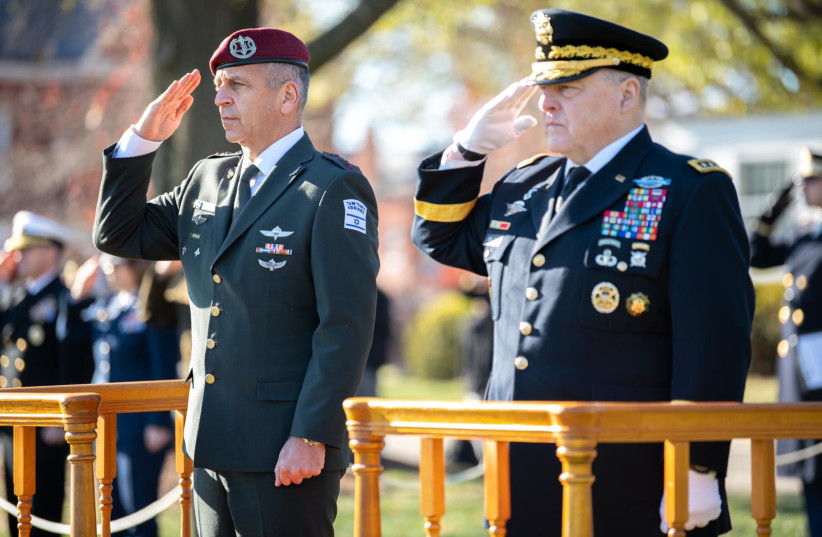Israel struck a convoy of trucks carrying Iranian weapons along the Syrian-Iraqi border last month, IDF Chief of Staff Lt.-Gen. Aviv Kohavi confirmed on Wednesday.
Without specifying the exact timing, it appeared clear that he was referring to an attack within Syria, next to the Iraqi border, which the Wall Street Journal and various other media outlets attributed to Israel in early November, but which Israel did not take responsibility for at the time.
According to reports at the time, the caravan was moving Iranian weapons, likely including powerful missiles, from Iraq to Syria, and around a dozen Islamic Revolutionary Guard Corps members and other Iranian-affiliated forces were killed.

Speaking at a conference at Reichman University, Kohavi said the IDF had “perfect intelligence” to hit “truck No. 8” out of a 25-truck caravan, because it knew that this truck was the one containing Iranian weapons.
Describing the operation, he said the IDF needed to send the IAF to the correct location and that the aircraft “needed to evade surface-to-air missiles. Don’t make any mistake, there are operations where they fire between 30 to 40 surface-to-air missiles,” sometimes even reaching 70 missiles.
The IAF needed to “attack, to actually hit [their targets] and to return [without being shot down by the surface-to-air missiles],” Kohavi said. “During some of the attacks, they also need to avoid killing people who should not be killed. These are very advanced capabilities.”
Iraqi authorities covered up strikes
Iraqi authorities at the time had claimed that the caravan was comprised entirely of civilian commercial items, including gas.
Some reports have speculated that the smuggling move was a new tactic by Iran to try to avoid detection and not anger the Syrian regime, which has lost patience with the cost it pays from Israeli strikes on Iranian forces within its territory.
Kohavi gave this example to show how crucial the revolution he led in connecting intelligence to operations during his approximately four years as IDF chief was to Israel’s security.
He said the IDF’s “war between wars” has not been hermetic and that Tehran has sometimes succeeded in smuggling weapons to Syria and Hezbollah in Lebanon. But overall, Iran’s dream of a “new Hezbollah” in the Syrian Golan Heights has been thwarted, he added.
In addition, Kohavi said these and other unspecified actions against Iran were deterring it from a broader conflict with Israel.
Furthermore, “when reality changes fast, we need to design new techniques and manpower for war to be ready for that,” he said. “If that means capabilities are not appropriate,” the IDF will fall behind.
Kohavi, maybe in a nod to a potential political future, said national security strategy was “not limited to the military” but also involves other mediums, including, “statecraft, military action, social, economic and cultural,” strategies and actions.
Hamas is staying out of fighting
Likewise, Hamas in the Gaza Strip has stayed out of a number of conflicts in the area because of the punishment it received from the IDF during Operation Guardian of the Walls, the Gaza war in May 2021, he said.
Kohavi cited as examples that Hamas has not fired from Gaza during the last eight months, and the IDF and security forces have regularly detained Hamas agents in the West Bank.
As bad as the recent terrorist attacks from the West Bank have been, the terrorist wave could have been much worse if Israel had not acted strongly and kept Hamas in Gaza deterred, he said.
More than 400 potential terrorist attacks had been thwarted in the last year by IDF and other security forces, Kohavi said. A Shin Bet (Israel Security Agency) report released on December 5 put that number at 500 potential thwarted attacks.
Further, he emphasized that Hamas stayed out of the August round of fighting with Islamic Jihad.
Explaining how this deterrence was achieved, Kohavi said Israel was confronted only a few years ago with “regular protests on the border… fires in the fields [from fire balloons], rockets almost every Friday, and we worried about kids in Sderot. This stopped around two years ago and even more after Operation Guardian of the Walls.”
The IDF had destroyed an extensive volume of Hamas tunnels and flagged that Hamas “knows we can destroy the rest of their tunnels,” he said.
“Eighteen terrorists in a tunnel were trying to invade a Jewish village just north of Gaza,” Kohavi said. “We had intelligence, we knew about the tunnel, we knew its depth, and we knew we had a bomb to hit the exact depth of the tunnel, and we had trained pilots who knew exactly how to drop the right bomb. This is not an obvious thing – these are very special capabilities.”
